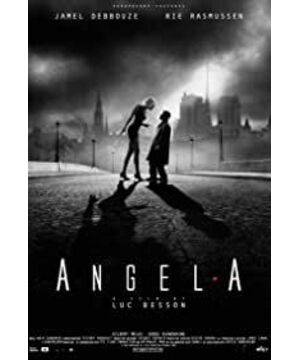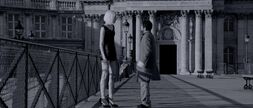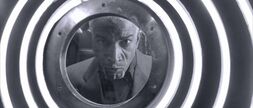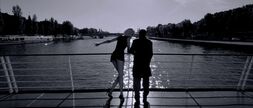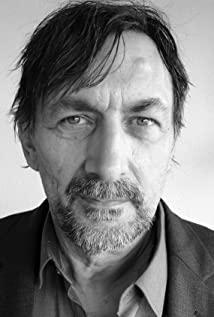In movies, black and white images are not only used to express memories of past events, remembrance of the deceased, and fantasies about non-existent things, but also used to magnify and portray certain special inner feelings of the characters in the film. There are also some directors who use black and white contrasting with the splendid bright colors to express a certain emotion and a certain kind of thinking hidden deep in their personal hearts. For example, Wim Wenders, he said that his black and white films are all ideological things that he really wants to express. At the beginning, he does not know the end, and he does not know whether everything will be stillborn. Of course, there is also a black and white that is only for visual satisfaction and has no other meaning.
And what about Angel-A?
Is Aagela just a mental hallucination of André?
What is the purpose of its black and white?
Last year, when I first heard that the film was called "Angel A", I secretly screamed, thinking that maybe Luc Besson had broken his promise that he would only make ten films, and would continue to make "Angel B" or "Angel B" in the future. "Angel C"? Only later did I find out that "Angel-A" was referring to Aagela, which was the name of the heroine in the film, and another translation was "The French Fairy and the Tramp". I prefer the latter, with a little bit of innocence and a bit of a fairy tale flavor.
In fact, for some fans of Luc Besson, "Angel-A" is really nothing to watch - no gunfights, no dreamy colors, and no longer nervous, exciting and thrilling. Maybe Luc Besson should really close the mountain - some film reviews People write so disappointed. When Luc Besson was promoting, he said that the outline of "Angel-A" was written as early as ten years ago, but the dialogue has been left empty. Ten years is a period of time that is neither long nor short, and a period of time that is enough to make a person change from complex to simple. Luc Besson left the subway, left the sea, left the killer, he stepped into the quiet Paris, that's all. I like him like this, the fairy saving the homeless man, and the simplicity of the homeless man falling in love with the fairy—whether that's what he wanted to express, or there was something more intriguing about it.
At the beginning of the film, Luc Besson once again promoted his anti-war ideas - he has always been a peace-loving person, and he advocated this idea through movies, such as the ruins of civilization after the nuclear war in "The Last Battle", and "The First". "The Fifth Element" in "The Five Elements" who wept bitterly because of reading human history. And in this film, André, who first introduced himself, said: I am an American, and I think the French are more lovable than the stupid war our country had against Iraq. Afterwards, the gang members who were chasing André told him to shut up, unable to say a word, but to breathe: "It's hard, isn't it? A goddamn American should shut up his stinky mouth and let the whole world have freedom of choice. ..." I think everyone who opposes the US acting as the world's policeman and the war against Iraq will smile knowingly.
Unable to repay the debt, André went to the bridge to commit suicide, where he met a woman who also wanted to commit suicide and jumped into the sea to save her without hesitation. She followed him, trying to help him repay his debts, and then told him that she was an angel sent to take him away, and that she would leave after the injury was done...
There is a bridge that is more metaphorical in the film. André wanted to kill himself, in the middle of the bridge. It was also here that he met Angela, rescued her, and took her away. They meet and know each other, and the bridge is the beginning of a period here. Halfway through, they argued fiercely on an iron bridge, and in the background, far across the bridge when they first met, each stretched out halfway behind their backs. The last time the bridge appeared was when Angela was about to leave. Andrér hugged her and didn't let her go, and the two flew into the air together before falling into the river. Then Andrér climbed to the shore - also climbed up at the place where he rescued Angela for the first time, the difference was that he had never been swimming in love to the other side where he knew love, and after a few calls, Angela also climbed ashore - this time He climbed up smiling. The bridge has finally fulfilled its own mission, and love is fully united.
Attentive viewers will also find a small detail - before André met Angela, when he was threatened to break his head, when he was threatened to throw him off the Eiffel Tower , and even when thrown into the street by security guards, his right hand was always in the pocket of his coat. Then he jumped into the river and rescued Angela, she was seducing men in the ballroom and he sat at the bar to collect money and drink, and they ate together... Even at the end, he said to Angela that he loved her, her double-hearted rags And when he was about to fly away, when he jumped up and hugged her... his hand was always in his coat pocket, even when they all fell into the water, when their lives were hanging by a thread in the deep water, his hand was not there. Get out of that pocket -- that's because Gamele Dubz, who plays André, unfortunately lost his right hand at the age of eight. Dubuz is a comedian himself, and that's why many viewers want to laugh when they see him, especially when he's 165 in front of the tall Leigh Rasmussen who plays Angela!
The cinematography of this film is exquisite, and the Paris under the picture looks like a black and white postcard. The end of the film seems to pay tribute to Wim Wenders, borrowing the bronze statue under the sky in "Under the Berlin Sky". But those philosophical dialogues require a little patience and can even be a little tiring. That is to say, the biggest disadvantage of this movie is that the dialogue makes the image procrastinate, and the words that are too deliberate make the image lose its sense of smoothness. However, the charm of the film itself lies in its hidden playfulness, just as I finally found out that "Angel-A" is actually the meaning of the two angels Angela + André.
In the end, you can think of it as a desperate schizophrenic hallucination of a man, or as a tale of a tramp falling in love with a fairy. What you believe in your heart will see what you will see, as the philosopher said: people only see what they need.
And I am a person who believes in the existence of angels.
View more about Angel-A reviews


